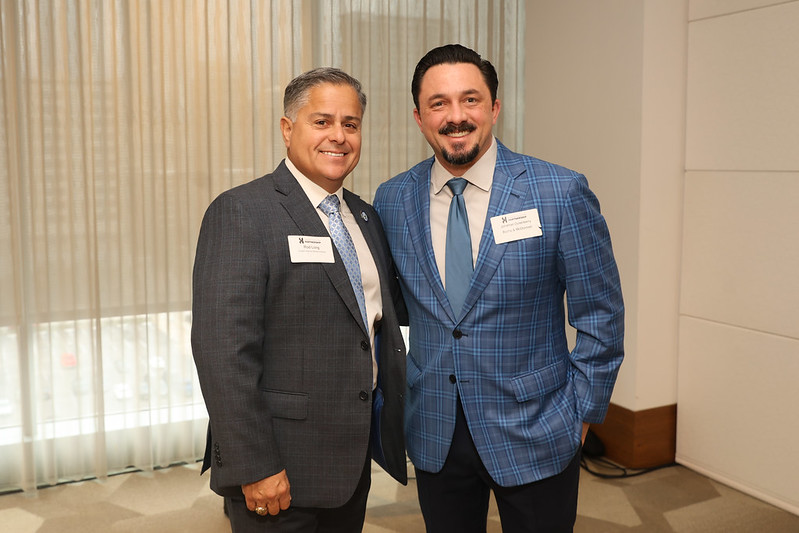10 Takeaways from the 2020 Houston NEXT: An ERG Summit
Published Oct 26, 2020 by Casey Schrade
The Partnership convened nearly 700 business leaders, diversity and inclusion officers, HR professionals, recruiters and ERG leaders at the third annual Houston NEXT: An ERG Summit October 15-19. The summit explored how Houston can and should take a leadership role in addressing diversity, equity, inclusion and justice for our region and workplaces.
Through presentations and discussion groups, thought leaders and attendees shared best practices, challenges, recruitment/retention needs and suggestions on championing D&I in the workplace. Here are 10 key takeaways:
- Diversity and inclusion should carry as much weight as any other business measurement in your organization. Diversity of thought and including different voices at the table can help drive business impact and outcomes. Encourage leaders to include a diversity and inclusion component within their performance review metrics.
- Use employee resource groups (sometimes called business resource groups) and employee networks to engage people around common passions and interests. Dr. Terri Cooper discussed how Deloitte uses their employee councils as a source to host courageous conversations. “The purpose of these councils is to bring together people of different backgrounds and different experiences to engage in conversations regarding what’s happening in the community, employee well-being, professional development and perhaps most importantly, issues relating to diversity and inclusion.”
- Executive sponsors, allies and advocates are key supporting elements that allow for employee resource groups (ERGs) to have the greatest impact. Organizations must consider how to measure the success of their ERGs. Are they tied to your talent attraction and retention efforts? Do you look to ERGs for promotions, leadership abilities, etc.? Do you source ideas from your ERGs for innovation within your organization, like policies and procedures?
- ERGs and employee networks are all about deliberate action and driving culture. Jeff Dingle shared that accountability, matched with elaborate training and a culture of inclusive thought, is the deliberate action Jacobs is taking to drive culture further toward an inclusive environment.
- It is important to continue to drive research to understand the needs of each generation in the workplace. In a 2017 Deloitte study, it was apparent that many new professionals in the workforce no longer wanted to be seen from a one-dimensional perspective. Young professionals were looking for ways in which they could embrace their multi-dimensional characteristics, come together and create a more collaborative environment to learn from each other, share experiences and truly create an inclusive culture.
- Waste Management's Tiana Carter emphasized organizations are reevaluating all aspects of business as a result of the pandemic. Take the step to consider a workforce evolution taskforce, comprised of individuals with different backgrounds, at different levels and different subject matter expertise, to evaluate the need to evolve an organization's business model, workforce, processes, procedures and pandemic response efforts. Be in a position where you are ready to act. You may not have all the answers right now, but transparency is more important and valuable for employees and team members. Be okay with the possibility of having to say, “we may not always get this right but we’re going to try.” It’s that effort that makes people want to go on a journey with you.
- All diversity and inclusion efforts start with communication, transparency and accountability. It is important your inclusion and diversity strategy is based on the needs of the employees and what they want, versus what you think they may want and need. Work to understand your employees through courageous conversations at all levels, pulse point surveys, discussion forums and share the results.
- Attendees shared what an inclusive corporate culture should look like. It's where employees feel they can bring their true selves to work every day without the fear of being judged. Employees are completely comfortable to speak their mind, certain levels of leadership are in the room for D&I discussions and employees can speak comfortably without fear of retribution. Everyone has a voice and access to resources.
- The distributed approach adopted by Matt Mullenweg's company Automattic gives employees a great deal of personal freedom and autonomy to get the job done in a space of their choosing and in their own way. “When people are really happy and fulfilled in the rest of their life, they bring their best self to work,” Mullenweg said. He interviews managers in his Distributed podcast to share best practices and he also shares his Distributed Work's Five Levels of Autonomy and encourages companies that can "enable their people to be fully effective in a distributed fashion can and should do it far beyond after this current crisis (the pandemic) has passed."
- Mullenweg shared there is a difference between remote and distributed work. "The work must get done. When you're in the early levels of distributed autonomy, the people who aren't in the office might actually be remote. They might be operating at 70-80% of someone who is there (in the office). That's a perfect opportunity to identify that and see what you need to do in how you hold meetings, how you communicate and operate to allow them to be fully productive." If you can operate decentralized and work in a distributed model, "you'll be primed to succeed in the coming decades."
Learn more about the Partnership's Talent Resources Group here. Click here to learn more about the Partnership's work to advance racial equity and justice.
 The Houston Report
The Houston Report



















